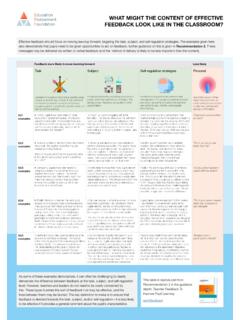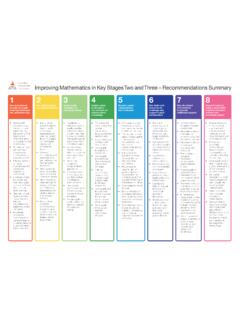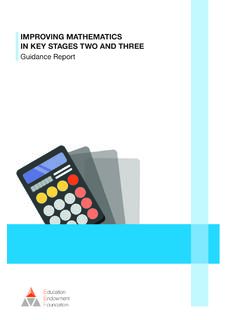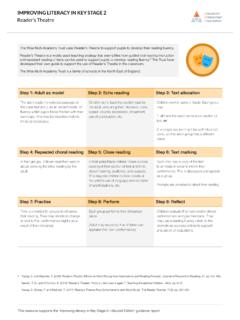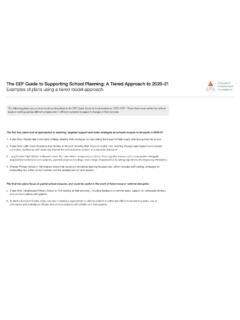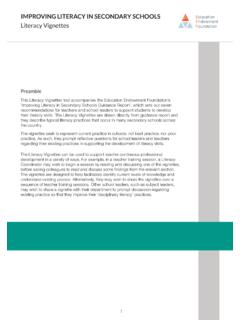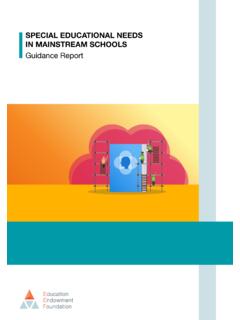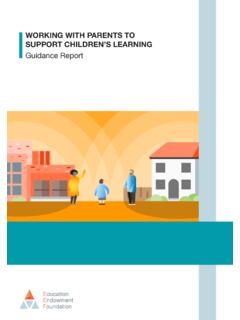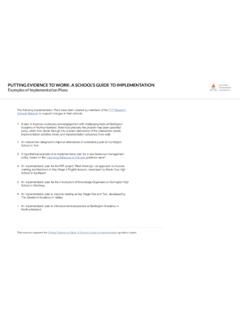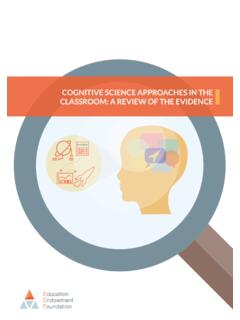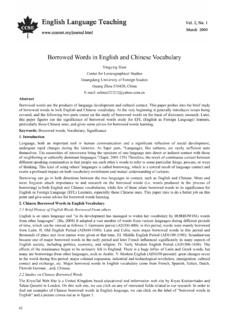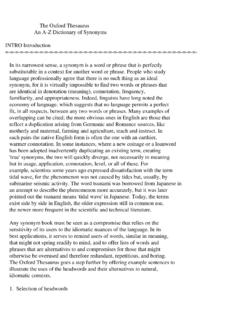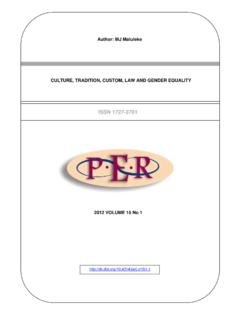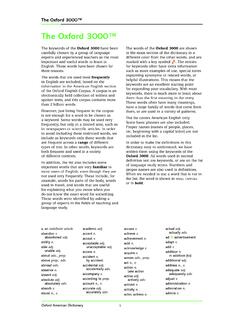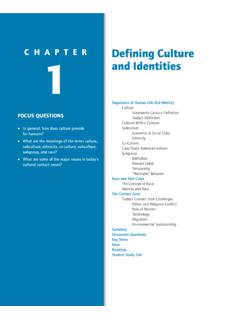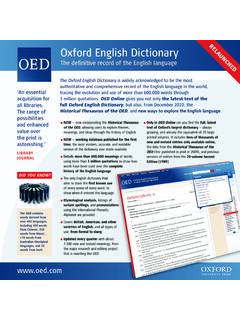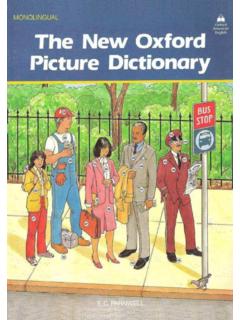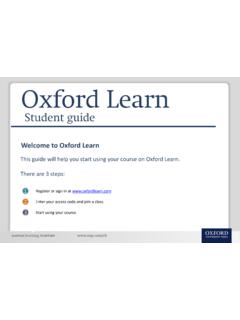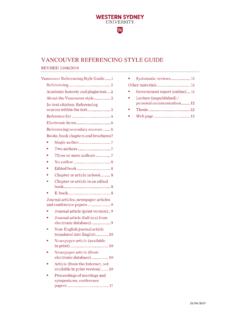Transcription of IMPROVING LITERACY IN SECONDARY SCHOOLS
1 Guidance ReportIMPROVING LITERACY IN SECONDARY SCHOOLSE ducation Endowment Foundation We would like to thank the many researchers and teachers who provided support and feedback on drafts of this guidance. In particular, we would like to thank the Advisory Panel and Evidence Review Teams:Advisory Panel: Dr Helen Breadmore (Coventry University), Scott Davies (Kingsbridge Community College), Dr Velda Elliot (University of Oxford), Amanda Fleck (Brentford School for Girls), Dr Jonathan Haslam (Institute of Effective Education), Dr Elisabeth Pickles (Highworth Grammar School), Louise Quinn (The Academy at Shotton Hall), Dr Jessie Ricketts (Royal Holloway), Professor Robert Slavin (Johns Hopkins University) and Dr Emma Vardy (Coventry University).
2 Evidence Review Teams: Dr Helen Breadmore, Dr Emma Vardy, Dr Anna Cunningham, Dr Rosa Kwok, Professor Julia Carroll (Coventry University).Professor Robert Slavin, Cynthia Lake, Amanda Inns (Johns Hopkins University), Dr Ariane Baye, Dylan Dachet (University of Li ge), Dr Jonathan Haslam (Institute of Effective Education).Authors: Alex Quigley and Robbie Coleman (EEF). IMPROVING LITERACY in SECONDARY Schools1 CONTENTSF oreword 2 Introduction 3 Summary of recommendations 4 Recommendation 1 Prioritise disciplinary LITERACY across the curriculum 6 Recommendation 2 Provide targeted vocabulary instruction in every subject10 Recommendation 3 Develop students ability to read
3 Complex academic texts14 Recommendation 4 Break down complex writing tasks18 Recommendation 5 Combine writing instruction with reading in every subject22 Recommendation 6 Provide opportunities for structured talk26 Recommendation 7 Provide high quality LITERACY interventions for struggling students30 References 34 How was this guidance compiled? 372 Education Endowment Foundation FOREWORDY oung people who leave school without good LITERACY skills are held back at every stage of life.
4 Their outcomes are poorer on almost every measure, from health and wellbeing, to employment and finance. The most recent estimates suggest that low levels of LITERACY cost the UK economy at least 20 billion a year. In SECONDARY SCHOOLS , the challenge of IMPROVING LITERACY is fundamental. As this guidance documents, LITERACY is key to academic success across the curriculum, and is more important than ever as curriculum reforms place new demands on students and year, over 120,000 disadvantaged students made the transition from primary to SECONDARY school below the expected standard for reading.
5 The educational prospects for this group are grave. If their progress mirrors previous cohorts, we would expect 1 in 10 to achieve passes in english and maths at GCSE, and fewer than 2% to achieve the english , however, many SECONDARY school teachers have not seen themselves as LITERACY experts. Teaching children to read has been the domain of primary SCHOOLS , or the responsibility of teachers in the english department at a push. Some cross-curricular efforts have held promise, but, in most SECONDARY SCHOOLS , the challenge of LITERACY today is greater than guidance argues for a change in tack.
6 It emphasises that LITERACY in SECONDARY school must not simply be seen as a basket of general skills. Instead, it must be grounded in the specifics of each , this report makes the case that by attending to the LITERACY demands of their subjects, teachers increase their students chance of success in their subjects. SECONDARY school teachers should ask not what they can do for LITERACY , but what LITERACY can do for guidance report offers seven practical evidence-based recommendations, relevant to all students, based on the key concept of disciplinary LITERACY . It aims to support teachers in all subjects with strategies to help students read, write, and communicate develop the recommendations in this report, we not only reviewed the best available international research, but also consulted with teachers and other experts.
7 It is part of a series providing guidance on LITERACY and provides a companion to the guidance presented in our reports on Preparing for LITERACY , IMPROVING LITERACY in Key Stage One and IMPROVING LITERACY in Key Stage Two. As with all EEF guidance, publication is just the start of how we aim to support SCHOOLS to implement and apply recommendations in their context. We will be working with the sector, including through our colleagues in the Research SCHOOLS Network, to build on them with further training, resources and tools. And, as ever, we will be looking to support and test the most promising programmes that put the lessons from the research into practice.
8 Our hope is that this guidance will help to support a consistently excellent, evidence-informed education system in England that creates great opportunities for all children and young people, regardless of their family background. Sir Kevan CollinsChief Executive Education Endowment Foundation By attending to the literary demands of their subjects, teachers increase their pupils chance of success in their subjects. 3 IMPROVING LITERACY in SECONDARY Schools3 INTRODUCTION This guidance challenges the notion that LITERACY in SECONDARY SCHOOLS is solely the preserve of english teachers.
9 What does this guidance cover?This guidance report aims to help SECONDARY SCHOOLS improve LITERACY in all subject areas. It provides seven recommendations related to reading, writing, talk, vocabulary development and supporting struggling students. Throughout the report, recommendations emphasise the importance of disciplinary LITERACY is an approach to IMPROVING LITERACY across the curriculum. It recognises that LITERACY skills are both general and subject specific, emphasising the value of supporting teachers in every subject to teach students how to read, write and communicate effectively in their guidance challenges the notion that LITERACY in SECONDARY school is solely the preserve of english teachers, or LITERACY coordinators.
10 The emphasis on disciplinary LITERACY makes clear that every teacher communicates their subject through academic language, and that reading, writing, speaking and listening are at the heart of knowing and doing Science, Art, History, and every other subject in SECONDARY term disciplinary LITERACY , as used in this guidance, does not relate to students behaviour; rather, it stresses the idea of subjects as guidance also completes a group of EEF guidance reports focused on LITERACY , building on the Key Stage 1, Key Stage 2 and the Preparing for LITERACY reports.
